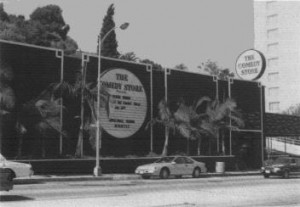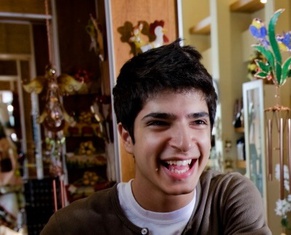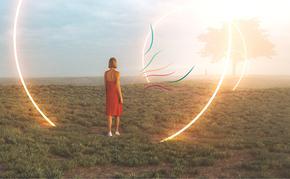The views expressed in our content reflect individual perspectives and do not represent the authoritative views of the Baha'i Faith.
So I was 35 years old, having a rough year, still battling the effects of PTSD from my stint as a medic in Vietnam, and I moved to Hollywood. I know – probably not the most psychologically-healthy decision, but I got work in the Motown building on Sunset Boulevard, and L.A. traffic precludes living more than a few linear feet from your job.
I quickly discovered that living in Hollywood means you need to find ways to laugh, emphatically and often. It’s a rough, ludicrous place – you’re always dodging the falling rubble of those broken dreams. So some friends and I, being young and fun-loving and generally broke, became regulars at The Comedy Store every Monday night because it was free and because it was unbelievably hilariously wonderful.
At that time in America, comedy was staging its big comeback. The old-style, not-very-funny-anymore comedians (“Take my wife – please.”) had mercifully faded away, and the new comics had a completely zany take on the absurdity of this physical life, a refreshingly strange and skewed and sweet brand of disarming humor that had us, and I’m not exaggerating here, laughing so hard we would fall out of our chairs and roll in the aisles. Literally, no kidding, I mean knocking over tables, spilling our mineral water everywhere, roaring with laughter. I still have bruises.

The Comedy Store
Monday night at the Comedy Store was Improv night, when the management tried out new talent and established comics tried out new material. Richard Pryor, Robin Williams, Whoopi Goldberg, Billy Crystal, Eddie Murphy, Steven Wright and some, like Sam Kinison, who were equally funny but sadly never got to grab the gold ring – they all spread hilarity and delight and joy. You had to ignore the crude stuff, which wasn’t that funny anyway, and wait for the existential humor. (“I put a skylight in my bedroom – my upstairs neighbors were really mad.”) We laughed until our sides hurt. You would wake up the next morning and your face would ache, and you’d realize, hey, guess I haven’t been using those smile-and-laugh muscles enough.
When you laugh like that, you realize later that it lifts your burden, makes things easier, that your life isn’t that bad. Laughter truly is therapy, because afterward you can look at things just a little differently, see the daft humor in it all and realize that it’s possible to actually transcend the seriousness of our earthly existence. When you go beyond the occasional chuckle and laugh long and hard enough it makes you aware that yes, life on this earth can be deeply, absurdly funny. That’s why we love the comics who can crystallize life’s absurdity for us, who can point out humanity’s follies, foibles and foolishness.
As a Baha’i, the joy and lightness of spirit those comedians gave everyone made me start looking for humor in religion. Not the first thing that comes to mind, right? Almost everyone thinks of religion as dead serious. I did, too, until I immersed myself in comedy and began to figure out how to laugh about this life. And guess what? Laughter and happiness are downright addictive. You get a little, you like it, you gotta have more. Pretty soon, I wanted every night to be Monday night. So I started to think deeply about the repeated advice and encouragement in the Baha’i writings to be happy. For the first time, I diligently tried to seek and understand and explore what leads to lasting, true human happiness.
That’s when I fell in love with the joy, cheerfulness and humor that Abdu’l-Baha personified. For Baha’is, Abdu’l-Baha represents the true example of what being a Baha’i is all about. Despite his incredibly hard life – exile, hunger, deprivation, extreme poverty and decades of imprisonment for teaching the Baha’i principles – Abdu’l-Baha was known the world over for his happiness.
Don’t get me wrong, he was no comedian – Abdu’l-Baha travelled the globe advocating peace and unity, became a world-famous activist, speaker and writer, was knighted by the British Empire for his service to the poor and spread the progressive Baha’i teachings all over the world. But despite all that serious work, or maybe because of it, he was deeply and profoundly and delightfully joyful. He personified joy with his radiant smile, his playful, ready laughter, his constant, simple question – “Are you happy?” – to everyone he met.
He said true happiness means catching a spark of the divine:
If a man become touched with the divine spark, even though he be an outcast and oppressed, he will be happy and his happiness cannot die. (Abdu’l-Baha, Divine Philosophy, p. 57)
 That made sense to me. The best comedians I knew had definitely been outcast and oppressed. Each of them had suffered deeply, and then found a way to transmute pain into glee, their comedy rising up out of their suffering the same way a lotus flower grows in a swamp. Abdu’l-Baha’s suffering hadn’t produced bitterness or cynicism or depression, though. Because it was for a purpose, a Divine cause, it was transmuted into love, into radiance, into joy:
That made sense to me. The best comedians I knew had definitely been outcast and oppressed. Each of them had suffered deeply, and then found a way to transmute pain into glee, their comedy rising up out of their suffering the same way a lotus flower grows in a swamp. Abdu’l-Baha’s suffering hadn’t produced bitterness or cynicism or depression, though. Because it was for a purpose, a Divine cause, it was transmuted into love, into radiance, into joy:
I was happy that — praise be to God! — I was a prisoner in the Cause of God, that my life was not wasted, that it was spent in the divine service. Nobody who saw me imagined that I was in prison. They beheld me in the utmost joy, complete thankfulness and health, paying no attention to the prison. (Abdu’l-Baha, The Promulgation of Universal Peace, p. 224)
With Abdu’l-Baha’s life as an example, I decided to try really hard to be happy.

















Comments
Sign in or create an account
Continue with Facebookor